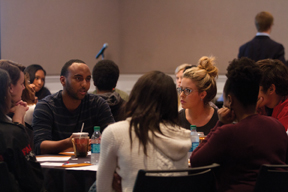
“If not us then who, if not now then when?” challenged Zane Cavender, a member of the SMU student leader panel at Tuesday’s Student Senate Diversity Committee’s round table discussion, The Elephant in the Room: Battling Bias.
The committee’s round table discussion focused on the topic of privilege, with the objective of identifying personal privileges as SMU students, brainstorming and executing solutions to bridge the gap, and discovering ways in which students can use these privileges to improve the SMU community and the lives of others excluded from privilege.
“The purpose of tonight’s discussion is for students to have the opportunity to engage in discourse about privilege, which is defined as a special right, advantage, or immunity granted or available only to a particular person or group of people. Our goal is for students to speak less, and listen more, even if it is in opposition of what he or she may believe,” stated Kimberly Elmazi, student senate diversity committee chair, in her opening remarks.
Students were split into small groups and given specific hypothetical scenarios about privilege, ranging in topic from religious privilege to gender specific privilege. The groups then identified the privilege in each example, built solutions as to how the issue can be addressed at SMU, and how individuals with this particular privilege use it to help others.
“Our committee puts on events like this with student leader panels to make the SMU student body more aware and hopefully make our campus a more diverse and accepting place. I think we are moving in the right direction,” said Samir Bajaj, Student Senate Diversity Committee member and small group facilitator.
A panel of students, faculty and staff answered questions and facilitated further conversations about privilege and diversity as a whole on the SMU campus.
“It takes a diversity of ideas and perspectives to initiate change within a community,” Lori White, the Vice President for Student Affairs said. “The key to building a cohesive community is to support one another, bridge gaps, educate and help others, become more aware, and most importantly, have a willingness to change.”








